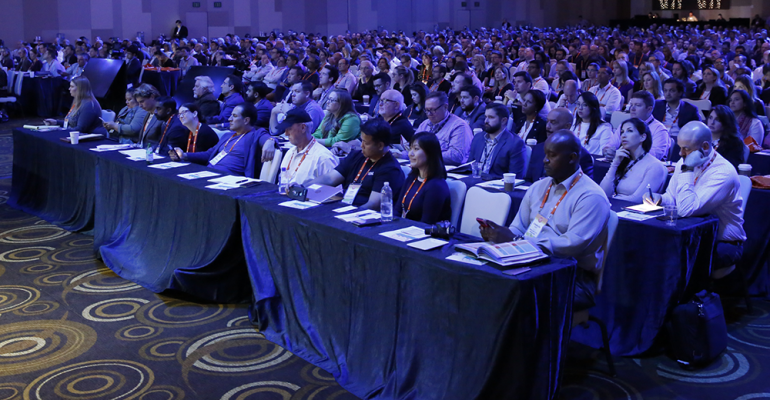Earlier this week, food retail professionals gathered in Las Vegas for the first Groceryshop conference. From Kroger to Albertsons and tech companies galore, here are seven highlights from the show.
1. Just like dating. Club chain BJ’s this year added a capability commonly found in dating applications. Customers can now swipe right on their smartphones and have products added directly to their online shopping cart for same-day delivery. BJ’s started its online program last year, and one of the goals at launch was convenience, something the retailer says the swipe-right action helps achieve.
2. Trash gets smart. Walmart has quietly gotten into the patent game recently, and one of the more recent ones is technology that links smart appliances, including trashcans and refrigerators. The idea would be that a Walmart would know when a consumer, say, throws away a used carton of milk. The retail giant would then know how quickly a consumer goes through milk and would be able to automatically reorder that product for delivery to the consumer.
 3. Looking to the future. Yael Cosset (left), chief digital officer at Kroger, spoke a little about the future of the food retail industry, saying that time was the thing that kept him up at night. “Do we push faster on an initiative or wait until the customer catches up?” he asked. He also said he saw the future of brick-and-mortar stores as changing the space allocation, with part of the store being used for fulfillment for either pickup or delivery and the rest of the store focusing on the in-store shopping experience.
3. Looking to the future. Yael Cosset (left), chief digital officer at Kroger, spoke a little about the future of the food retail industry, saying that time was the thing that kept him up at night. “Do we push faster on an initiative or wait until the customer catches up?” he asked. He also said he saw the future of brick-and-mortar stores as changing the space allocation, with part of the store being used for fulfillment for either pickup or delivery and the rest of the store focusing on the in-store shopping experience.
4. Fighting back. Weis Markets said the answer to fighting against Amazon was personalization and being relevant in your community. Rob Bonacci, VP of marketing and advertising at Weis, said the retailer did that in part by interacting through loyalty programs and using a personal touch with whatever they do. For example, a thank-you note is put in every pickup order with a cell phone number of an associate to call in case something wasn’t right with the order. “We have 100 years of heritage, so we’re going to use that,” Bonacci said.
5. Meal kits 2.0. Josh Hix, co-founder and CEO of Plated, said the company always envisioned retail as an important part of its business model, but it didn’t know how that would take place when they launched. Now, with retail partner Albertsons, Plated is taking the company into meal kits 2.0 and focusing on creating convenience for customers who have a last-minute use case but don’t want to wait hours — or days — for a meal kit to be delivered. Now, they can pick that up in a store.
6. Digital first. Online retailer Ocado says the notion that consumers don’t buy fresh online is a myth. And the company has the numbers to back it up — 48% of participation is fresh. The company is also beta testing some new features, including a calorie-saving application. When a customer checks out, they can see different items that are similar to the ones in their cart that would be fewer calories. The consumer then has the option of changing products and “saving” those calories. Ocado also tried something similar with a money-saving application but found the calorie application performed better and actually increased basket size.
7. Online to in-store. Albertsons says it is working to merge its physical-store customers and digital customers. And with good reason: Two-thirds of the coupons used in-store are digital coupons and more than 60% of e-commerce customers first hear about the online program in store.





